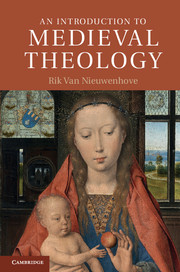Book contents
- Frontmatter
- Contents
- Abbreviations
- Chapter 1 Introduction
- Part I The legacy of the Fathers
- Part II Early medieval theologians
- Part III The eleventh and twelfth centuries
- Part IV The thirteenth century
- Part V The fourteenth century and beyond
- Chapter 17 Introduction
- Chapter 18 William of Ockham
- Chapter 19 Meister Eckhart
- Chapter 20 Jan van Ruusbroec and the Modern Devotion
- Chapter 21 Epilogue
- Bibliography
- Index
- References
Chapter 18 - William of Ockham
- Frontmatter
- Contents
- Abbreviations
- Chapter 1 Introduction
- Part I The legacy of the Fathers
- Part II Early medieval theologians
- Part III The eleventh and twelfth centuries
- Part IV The thirteenth century
- Part V The fourteenth century and beyond
- Chapter 17 Introduction
- Chapter 18 William of Ockham
- Chapter 19 Meister Eckhart
- Chapter 20 Jan van Ruusbroec and the Modern Devotion
- Chapter 21 Epilogue
- Bibliography
- Index
- References
Summary
Our knowledge of the life of William of Ockham is fairly limited. He was born in Surrey, in the south of England, c. 1288. He joined the Franciscan Order and studied in London and Oxford, where he lectured on Peter Lombard’s Sentences. In 1324, before he had formally finished his education, charges of heresy were formally brought against him. Ockham travelled to Avignon, where the papal court held residence. Here he remained for four years. The controversy surrounding apostolic poverty – in which the Pope adopted a position severely critical of the one propagated by the Franciscans – did little to improve Ockham’s views on the papacy of John XXII, especially after Ockham unearthed a document by Pope Nicholas III (1279–81) which supported the Franciscan view. On May 26, 1328, Ockham and a number of other Franciscans fled to the court of Louis of Bavaria. Excommunicated, Ockham was to stay in southern Germany (mainly Munich) under the protection of the Emperor, until the end of his life (after 1347, perhaps as a victim of the Black Death).
Ockham wrote his most important theological and philosophical works in the 1320s, such as his Commentary on the Sentences, a number of works on logic (including his Summa Logicae), a commentary on Aristotle’s Physics, a treatise On Predestination and Future Contingents, Quodlibetal Disputations, as well as treatises on the Eucharist. In his German period, he produced mainly political works on the limits of the power of the papacy, such as De imperatorum et pontificium potestate, Dialogus, and Opus Nonaginta Dierum. In those works, too, he heralds a new age, in which the boundaries between the secular and the religious realms are strictly drawn. In what follows I will not focus on the political writings of his later period. Instead, I will examine his nominalism, and the implications it has for theology.
Information
- Type
- Chapter
- Information
- An Introduction to Medieval Theology , pp. 253 - 263Publisher: Cambridge University PressPrint publication year: 2012
